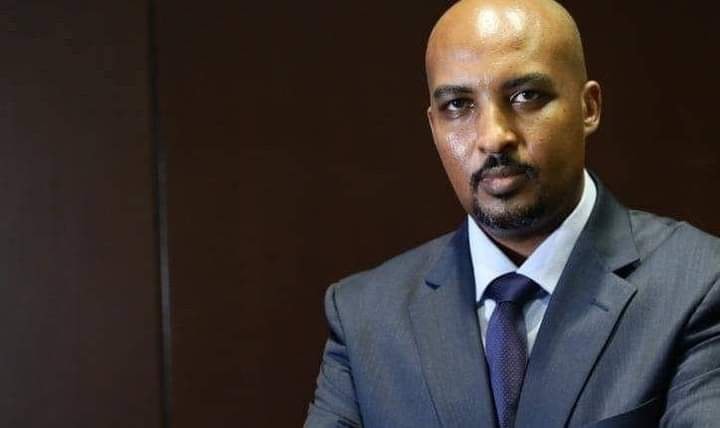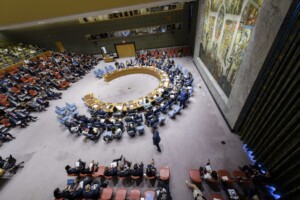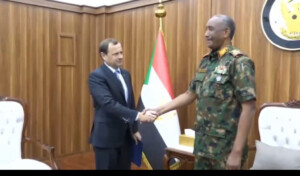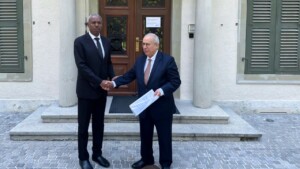Former governor of Kassala: ‘eastern Sudanese have overcome their conflicts’

Saleh Ammar, the spokesperson for the Eastern Sudan Civil Forces alliance, and member of Tagadom Executive Office (Photo: Supplied)
During the war between the army and the Rapid Support Forces (RSF) that has been raging in Sudan for more than a year, the eastern parts of the country gained importance. Radio Dabanga yesterday interviewed the spokesperson for the Eastern Sudan Civil Forces alliance, and member of the Tagadom Executive Office, Saleh Ammar, about the changes in the region, negotiations between the warring parties, and in particular the recent “racist remarks” of a former security director in Kassala about eastern Sudanese officials.
After the war broke out on April 15 last year, eastern Sudan (Red Sea state, Kassala, and El Gedaref) has become “the safe area” in which many Sudanese have taken refuge, including the army command and members of the de facto government that settled in Port Sudan, capital of Red Sea state. It has also become the centre of the Islamic Movement and affiliates of the regime of dictator Omar Al Bashir (1989-2019).
Recently, a statement by the former director of the General Intelligence Service (GIS) in Kassala, Gen Badreldin Abdelhakam, to the Sudanese radio caused widespread controversy because of the “hate speech and racism” it contained. In response, many Sudanese accused the leadership of the Islamic Movement of “trying to blow up the east”.
In this context, Radio Dabanga correspondent Ashraf Abdelaziz met with Saleh Ammar, the spokesperson for the Eastern Sudan Civil Forces alliance and member of the executive office of the Civil Democratic Forces coalition (Tagadom), and governor of Kassala during the civilian-led transitional government headed by PM Abdalla Hamdok (2019-2021).
Concerning the remarks of the former GIS-Kassala director, who doubted the ‘Sudaneseness’ of former eastern Sudanese officials, including Ammar, belonging to the Beni Amer, a Beja tribe living in Sudan and Eritrea, the former governor said that “the general’s talk is not new”.
He considers the remarks made by Abdelhakam “rather an extension of the policies practised in eastern Sudan, and specifically in Kassala, after the Freedom and Change government” that ended following the joint coup d’état by the Sudanese Armed forces (SAF) and the RSF against the Hamdok government in October 2021.
“The general’s statement is not isolated and not individual, but an example of a current within the security agencies in the region. This group caused all the conflicts in Kassala and in the other eastern states between 2019 and 2021. They were fully involved in the disputes. This general in particular was removed from its position after he crossed all the red lines and created conflicts with his counterpart agencies.
“It seems that he did not read the change that occurred in the region and in Sudan, and his speech met with widespread condemnation from all Sudanese and in particular those in the east, which shows that the eastern Sudanese have overcome the situation of the past few years. They have taken large steps forward and have held many social reconciliation events.”
On the question if the movement to which the general belongs is still active and will continue to sow discord among the communities in eastern Sudan, Ammar replied that “this formerly strong current depended on the power of the security apparatus and the military and is of course weaker than it was before. The war changed the balance of power in the country and made the SAF leaders settle in Port Sudan. Therefore, I do not see that this movement now has an interest in disturbing the situation in eastern Sudan and creating civil conflicts, I do not think that many of the leaders of security departments have an interest in creating a new conflict.”
Conflicts
Concerning the polarisation between the various political groups, such as the High Council of Beja Nazirs and Independent Chieftains and the Beja Congress in Opposition, in particular following the signing of the Eastern Sudan Peace Track in Juba in early 2020, the former Kassala governor stated that “everyone in the east is now convinced of the importance of peace and I believe that all parties have no interest anymore in igniting more conflicts. We of the Eastern Sudan Civil Forces support all reconciliation initiatives, even if they come from parties we are at odds with, because our strategic goal is peace.”
Abdelaziz further asked Ammar where the alliance, which “seems to be quite absent”, stands with regard to the efforts being made to unite the eastern Sudanese.
“Since 2019, the Civil Forces has been subjected to a great and difficult test, due to the social conflicts in eastern Sudan. Also, the performance of the civilian-led transitional government at the time was not at the required level, and therefore the alliance was affected by what happened in the transitional period. We did join the 2018 December Revolution movement and also rejected the October 2021 coup in huge demonstrations,” Ammar answered.
Detentions
“After the war erupted, we spent all our efforts on humanitarian issues, as the restrictions on political work in the east prevent the leaders of the Civil Forces from appearing and addressing issues in a clear manner. Therefore, a large part of the group has left the country due to the restrictions at home,” the Beni Amer leader explained.
“Since the military coup on October 25, 2021, political forces cannot carry out their activities in the east, so many of them resorted to humanitarian work, as I mentioned. The detention campaigns against activists are continuing, in particular in El Gedaref.
“Humanitarian activists there, like Waleed El Reyeh, Ziad Abdallah, Ayman El Hariri, Arif Abdallah, Hussein Idris, and many others are being held in detention. These young men were active in humanitarian work and founders of emergency rooms in the neighbourhoods. Everyone in El Gedaref knows that they are involved in humanitarian work, but security is detaining them without any clear reason.”
Shelter states
The cities and towns in eastern Sudan have become a destination for displaced Sudanese, refugees from bordering countries, and immigrants.
“Statistics for March say that the three states of eastern Sudan are hosting one million people who fled their homes: half a million in El Gedaref and the other half a million people are distributed over Kassala and Red Sea state,” Ammar stated.
“If we take El Gedaref for example, international organisations say that 82 per cent of the population suffers from food insecurity, 44 per cent of them are in poor health conditions, and 23 per cent even face difficulties in obtaining water. Displaced in Kassala and Red Sea state must have the same problems, while the authorities continue to hinder the work of international relief organisations. Popular efforts, which have contributed greatly to humanitarian aid, is hampered as well.”
Negotiations
As a member of the executive office of the Civil Democratic Forces (Tagadom) alliance, chaired by Hamdok,, Ammar confirmed the announcement of Tagadom Spokesperson Bakri El Jak, who said that SAF-RSF negotiations are supposed to resume in Jeddah within two weeks.
On the question if he thinks that the next negotiation round will be successful, Ammar replied: “All the Sudanese people and the regional and international community are now calling on the two parties to go to the negotiating table. The Sudanese people have suffered enough, more than ten million people fled their homes, and tens of thousands are dead or have been wounded. Tagadom will surely work to encourage the two parties to join the negotiations.”









 and then
and then